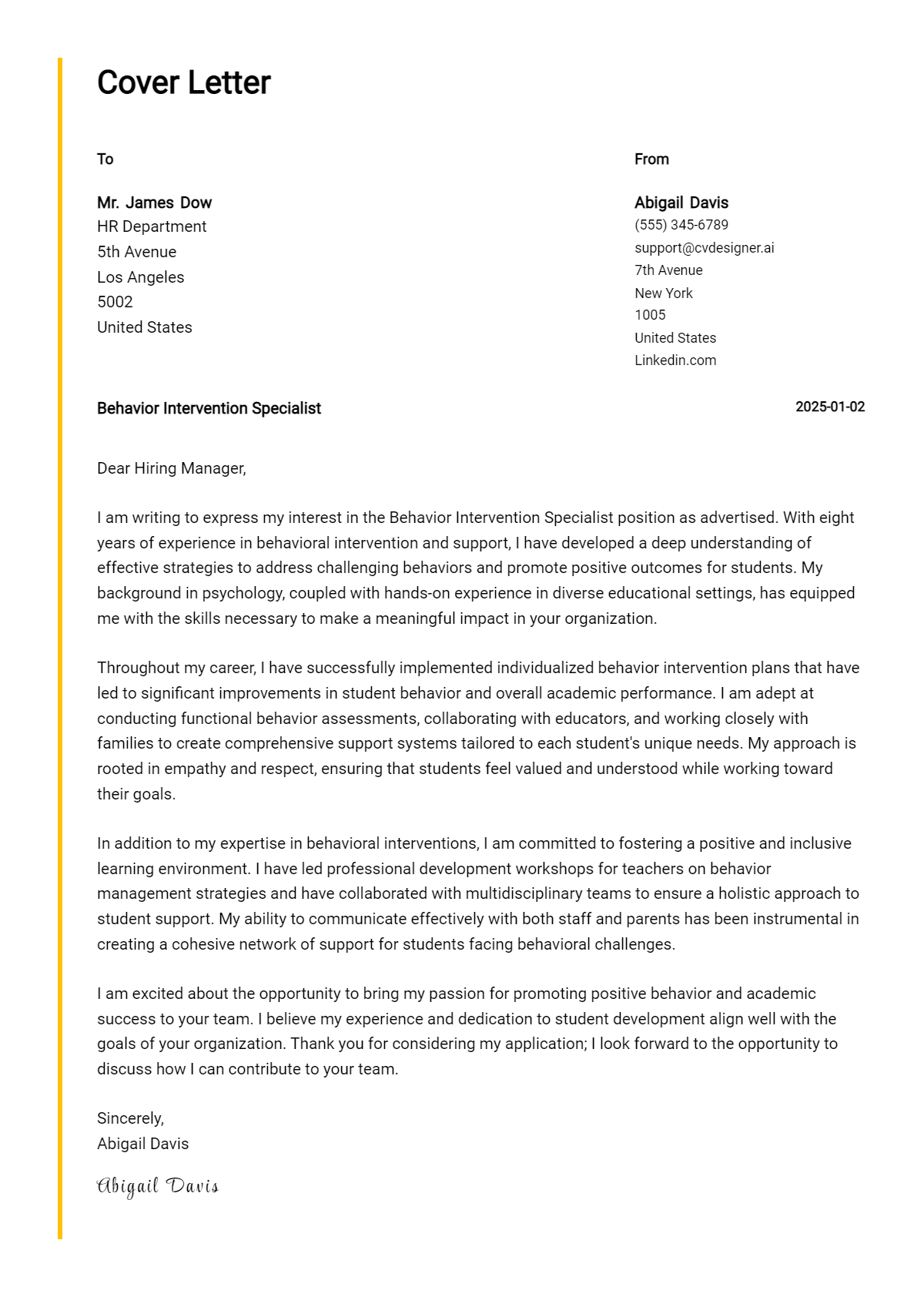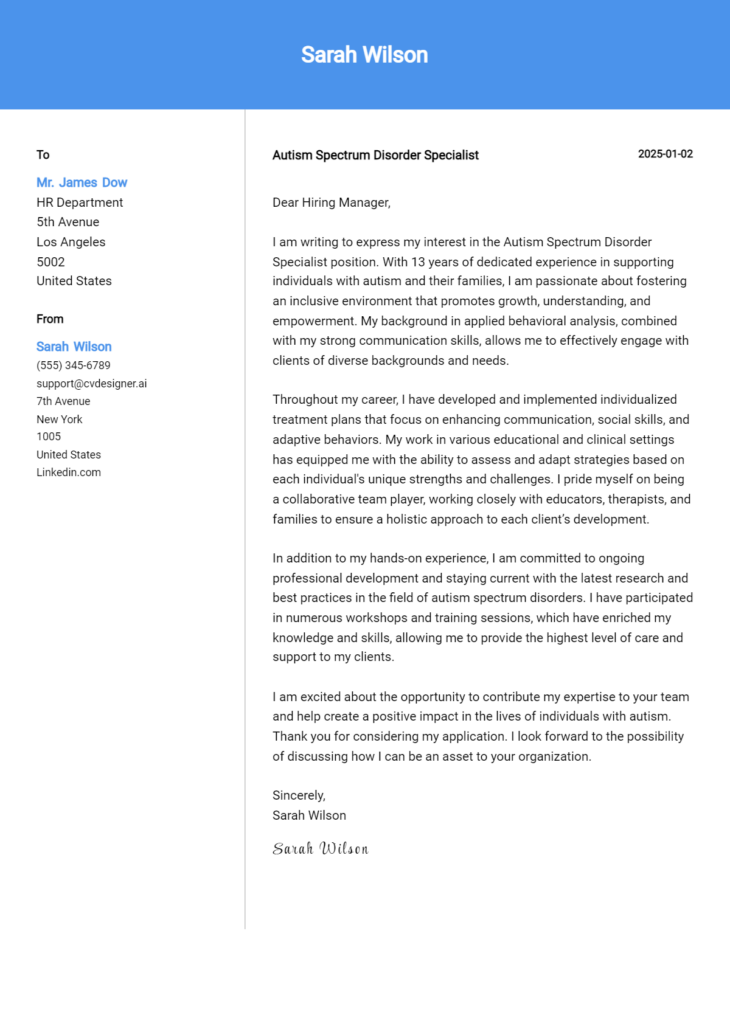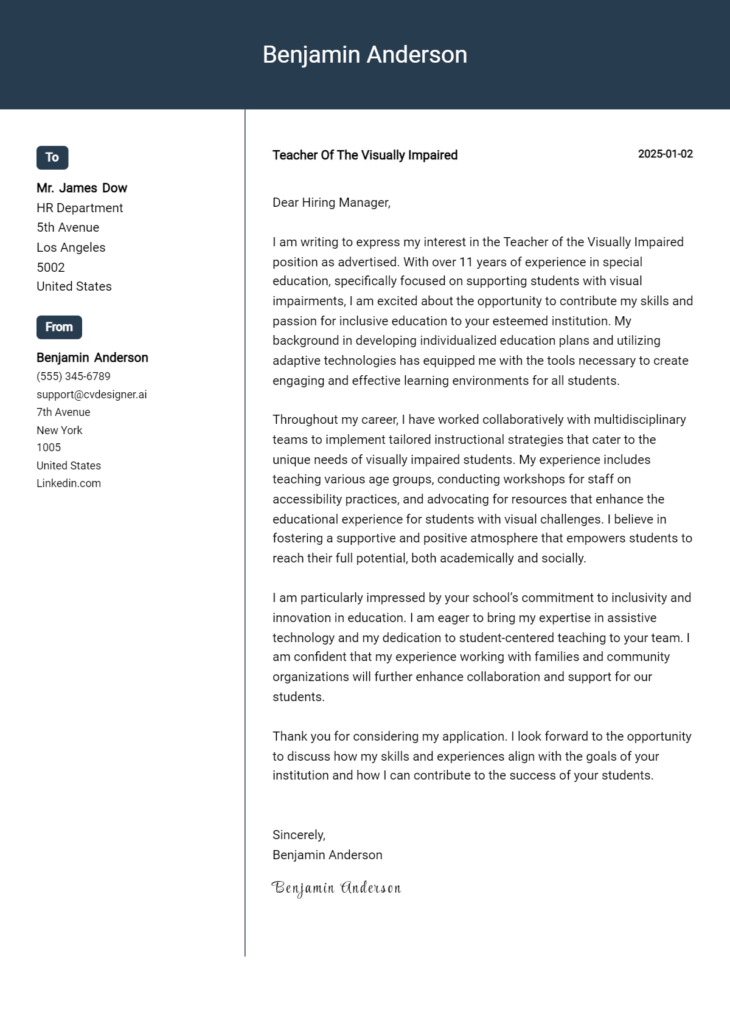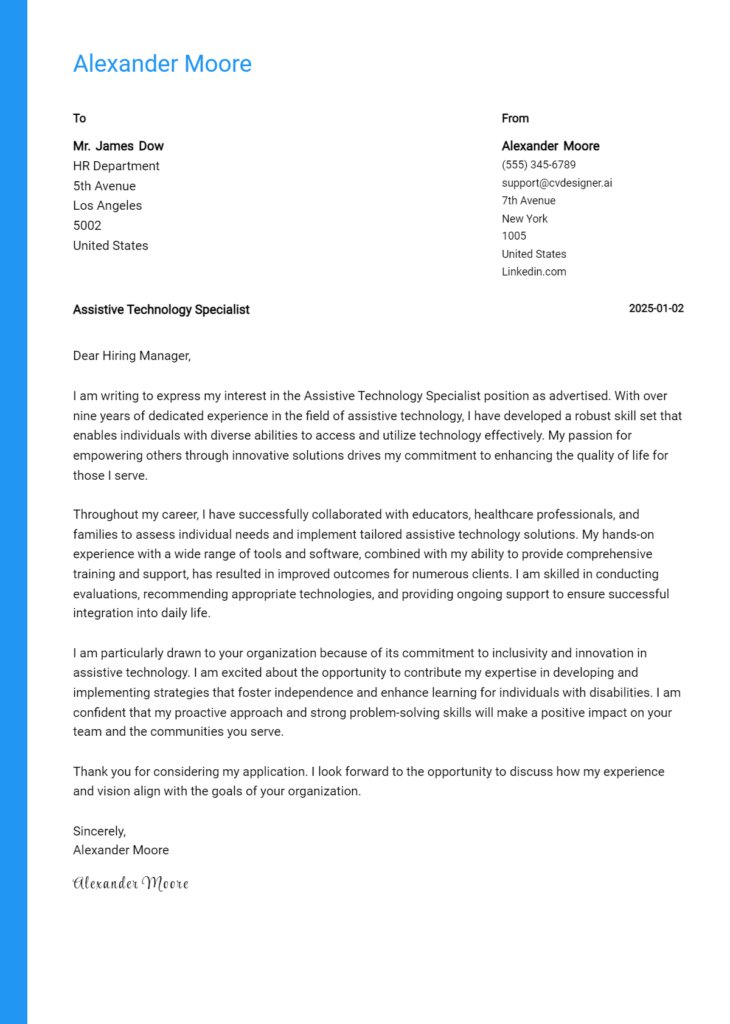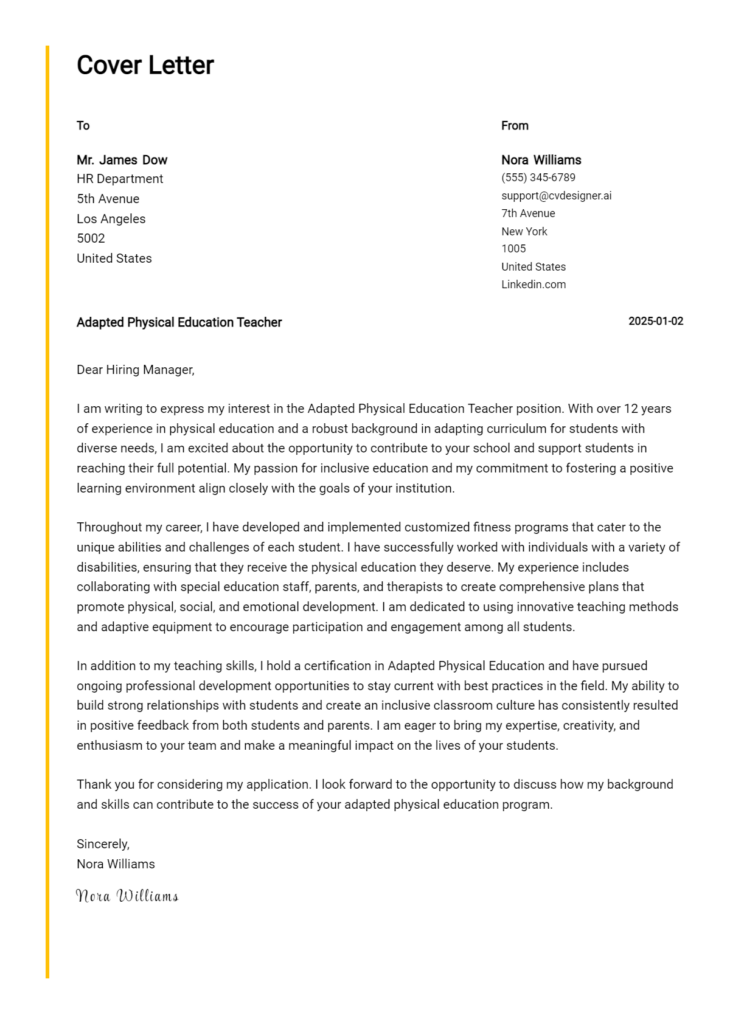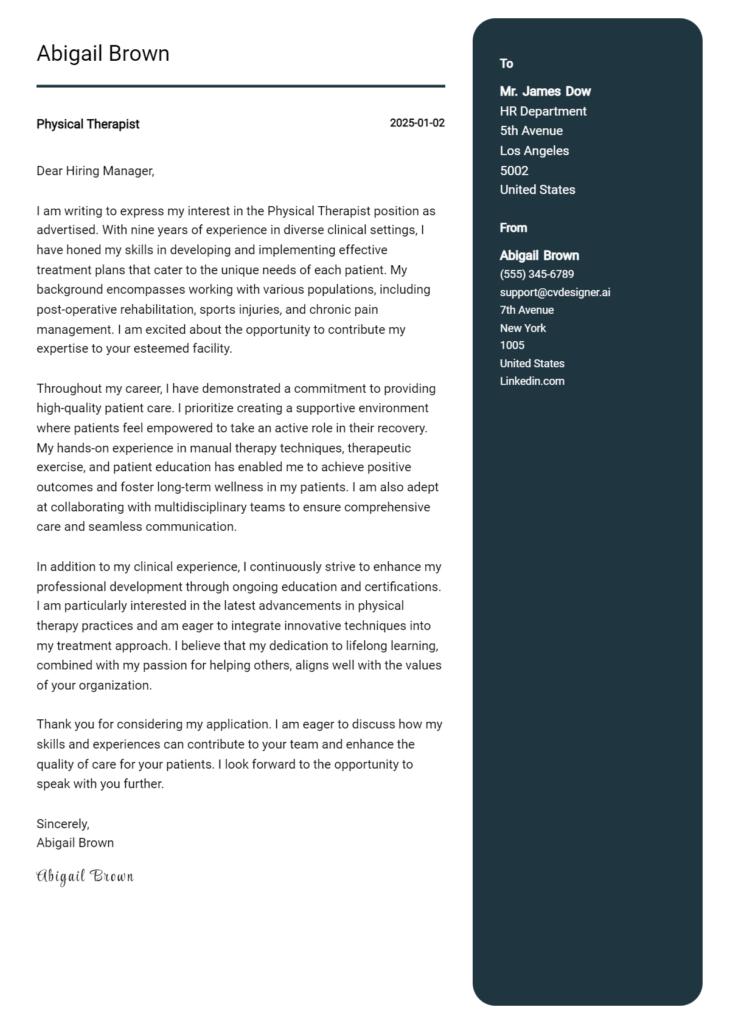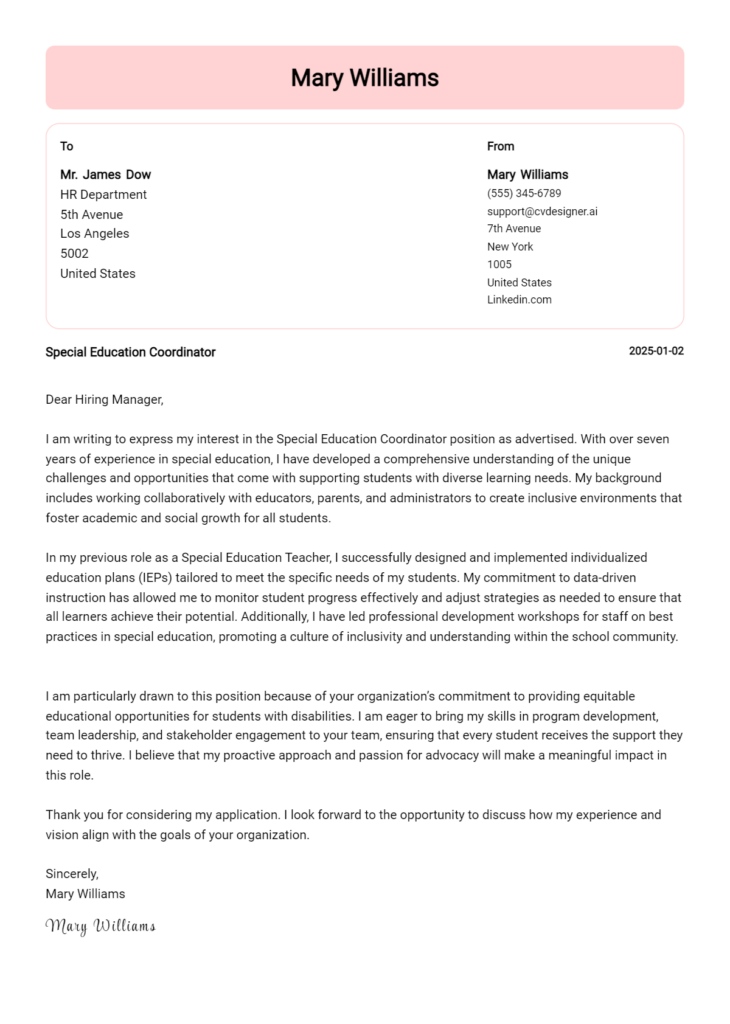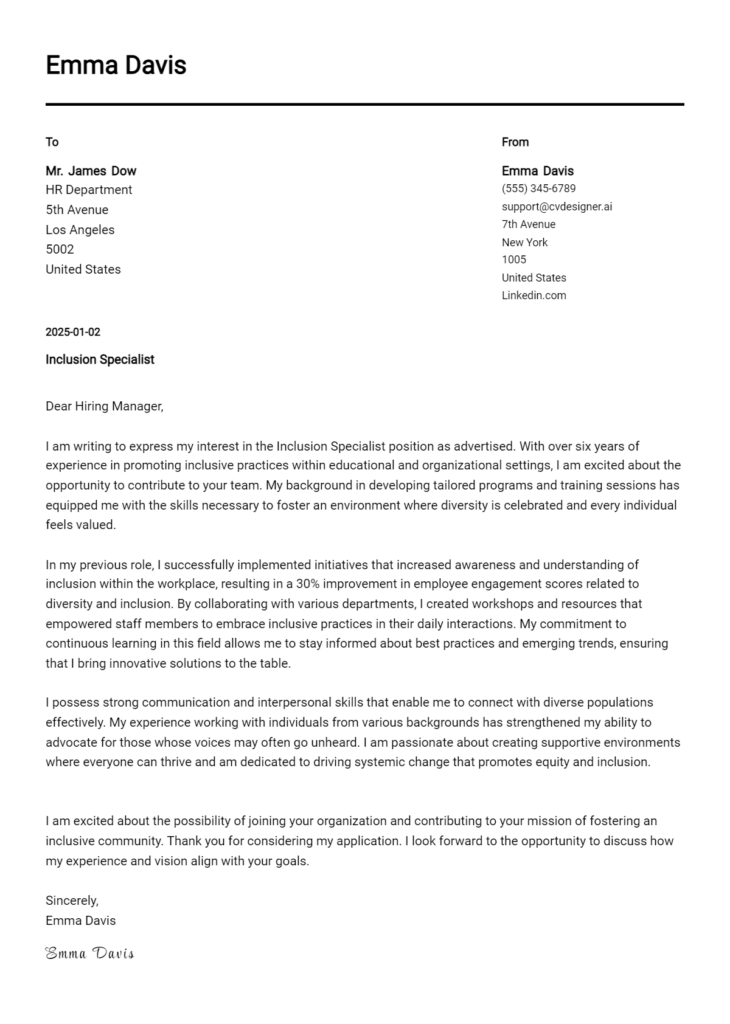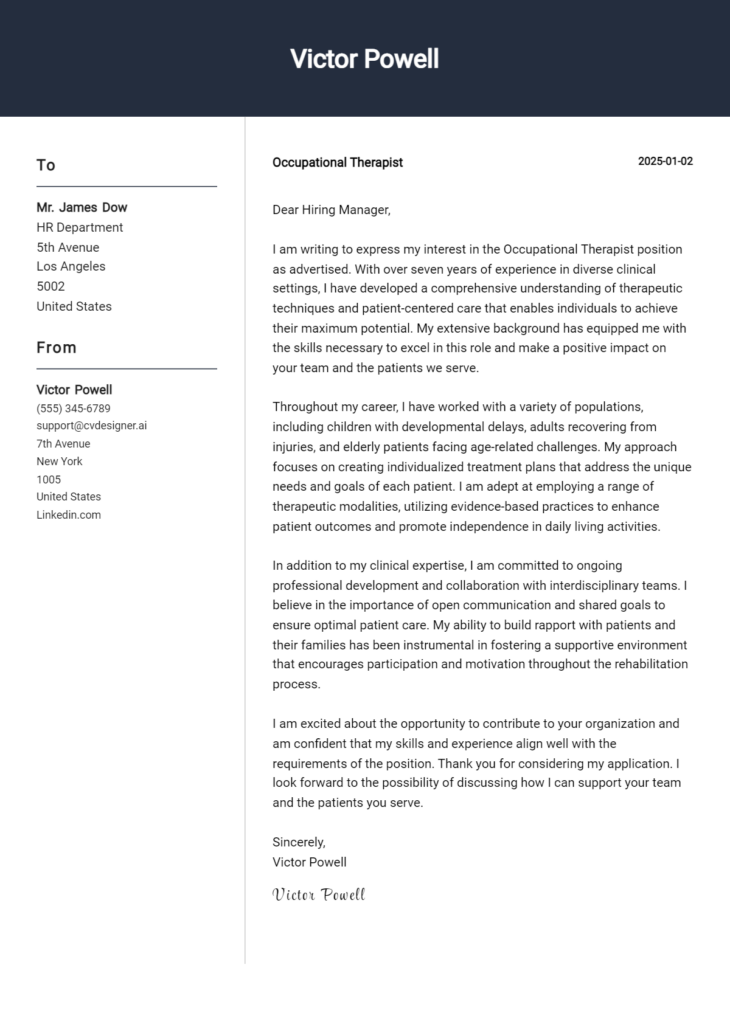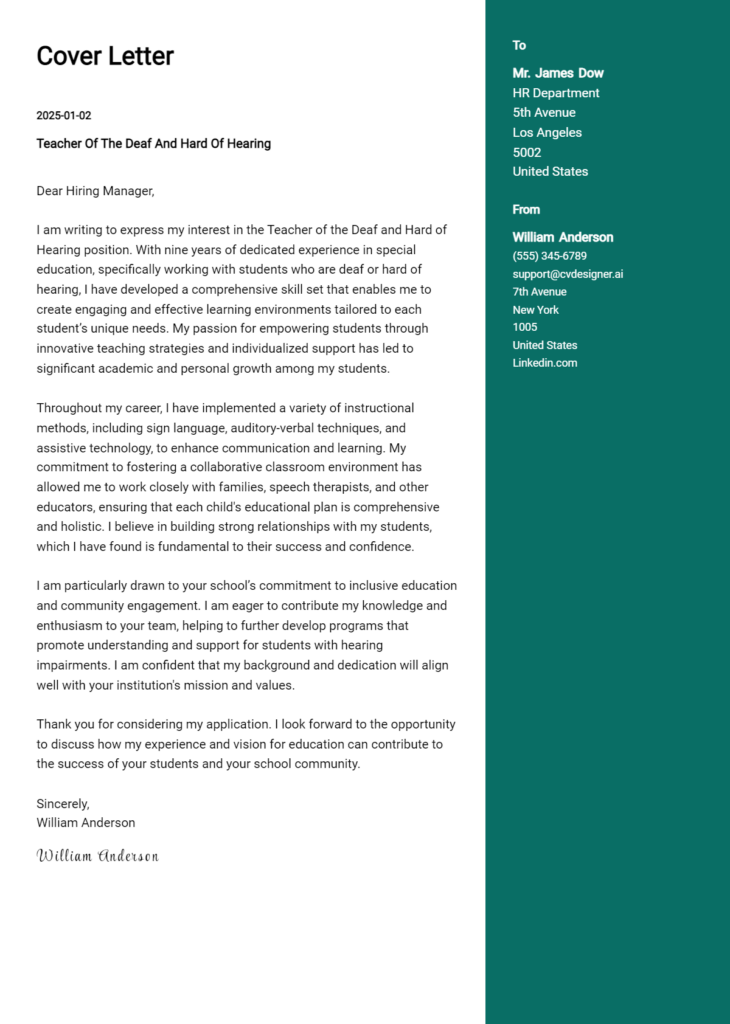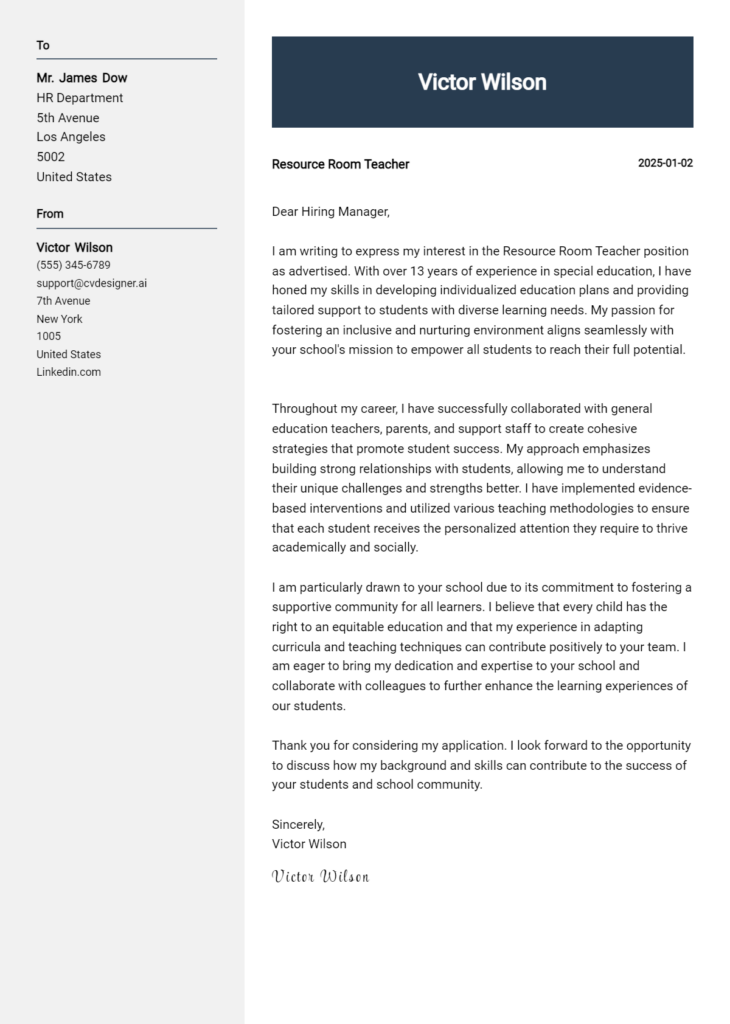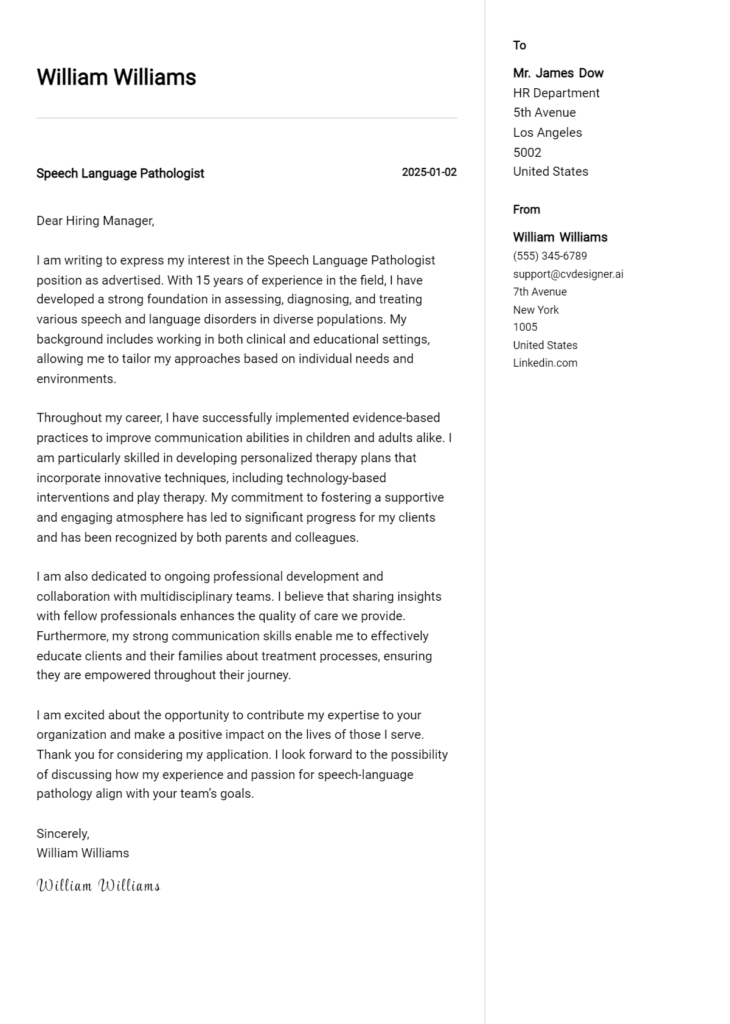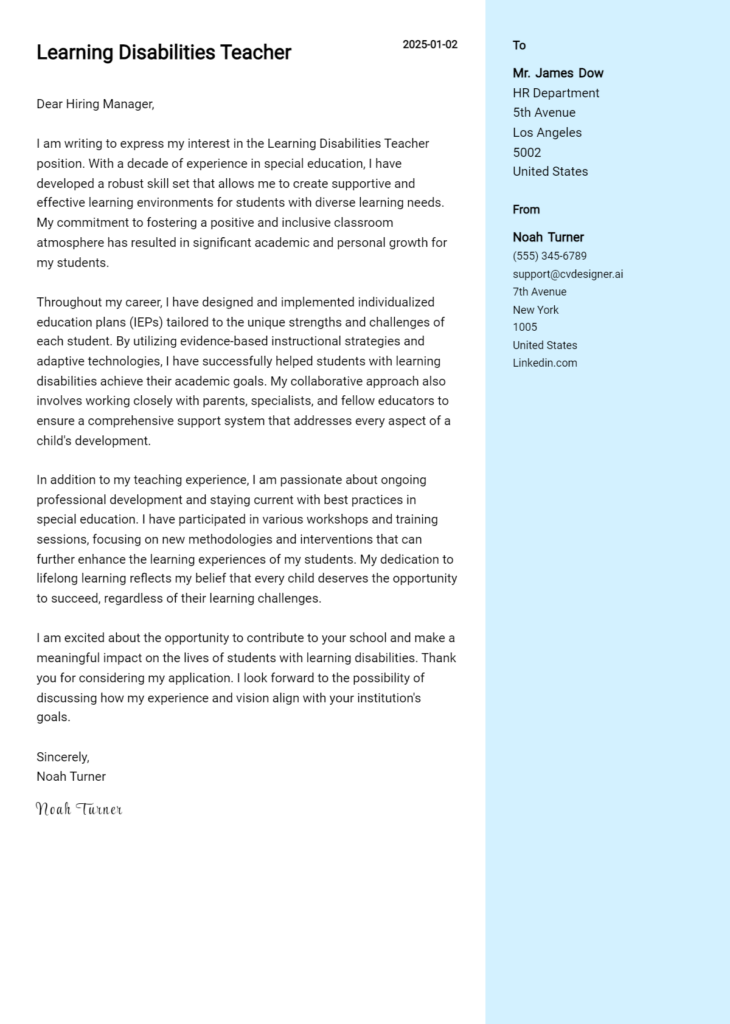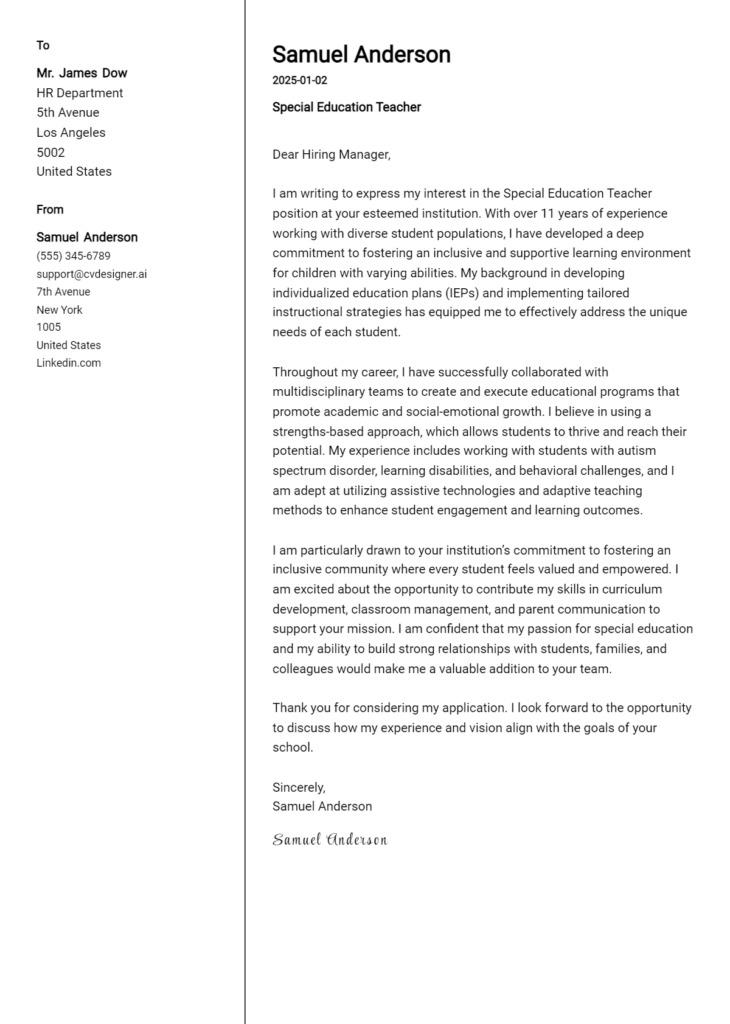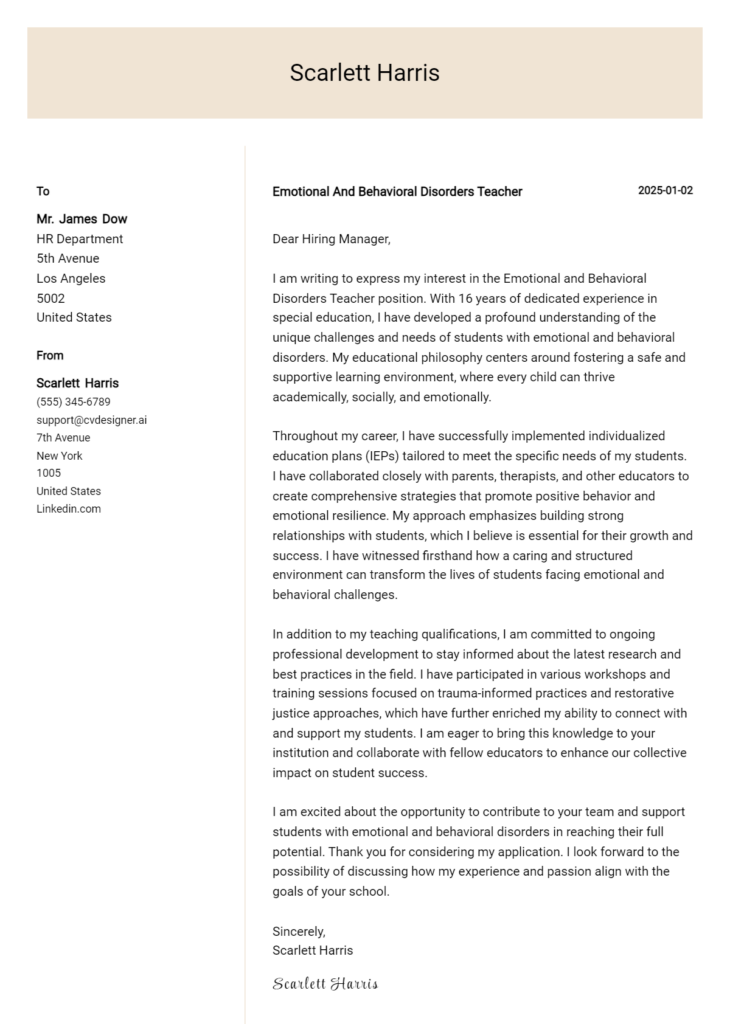Behavior Intervention Specialist Cover Letter Examples
Explore additional Behavior Intervention Specialist cover letter samples and guides and see what works for your level of experience or role.
How to Format a Behavior Intervention Specialist Cover Letter?
Crafting a compelling cover letter is essential for a Behavior Intervention Specialist, as it serves as your first opportunity to showcase your expertise and passion for helping individuals with behavioral challenges. The way you format your cover letter not only demonstrates your professionalism but also reflects your understanding of the nuances involved in behavioral interventions. A well-structured cover letter can effectively capture the attention of hiring managers, highlighting your ability to communicate clearly and thoughtfully—skills paramount in this field.
In this guide, we will outline the key components of a professional cover letter, including:
- Cover Letter Header
- Cover Letter Greeting
- Cover Letter Introduction
- Cover Letter Body
- Cover Letter Closing
Each section is critical in presenting your qualifications and dedication to the role. Let’s explore how to organize your cover letter to make a lasting impression.
Importance of the Cover Letter Header for a Behavior Intervention Specialist
The cover letter header is a crucial component of any job application, particularly for a Behavior Intervention Specialist. It sets the tone for your letter and provides essential information at a glance. A clear and professional header should include your contact information, the date, and the recipient's details, ensuring that your letter is easily identifiable and accessible. This clarity not only helps the recipient to know who the letter is from, but it also reflects your attention to detail and professionalism—qualities that are particularly valued in the field of behavior intervention.
Below are examples of a strong and weak cover letter header for a Behavior Intervention Specialist:
Strong Example
Jane Doe 1234 Elm Street Cityville, State 12345 (123) 456-7890 jane.doe@email.com October 1, 2023 Mr. John Smith Hiring Manager ABC School District 5678 Maple Avenue Cityville, State 12345
Weak Example
Jane D. 1234 Elm St. 10-1-23 To Whom It May Concern
The Importance of the Cover Letter Greeting
The greeting of your cover letter is a crucial element that sets the tone for the rest of your letter. It serves as the first impression and can demonstrate your professionalism and attention to detail. Addressing the hiring manager directly not only personalizes your application but also shows that you have taken the time to research the organization and its staff. A generic greeting can often come across as impersonal and may suggest a lack of enthusiasm for the role. To make a positive impression, strive to find the name of the hiring manager or the relevant contact person. If this proves difficult, consider reaching out to the company for clarification or utilizing networking resources.
Here are some examples of strong and weak greetings for a Behavior Intervention Specialist cover letter:
Strong Greeting Example
Dear Ms. Johnson,
Weak Greeting Example
To Whom It May Concern,
The Importance of a Well-Crafted Cover Letter Introduction for a Behavior Intervention Specialist
A compelling cover letter introduction is essential for a Behavior Intervention Specialist, as it sets the tone for the rest of the application. This initial paragraph should effectively capture the hiring manager's attention, convey the candidate's enthusiasm for the position, and briefly highlight relevant skills or achievements that align with the job requirements. An engaging introduction can differentiate a candidate from others, making it crucial to strike the right balance between professionalism and personal flair.
Strong Example
Dear [Hiring Manager's Name], As a dedicated Behavior Intervention Specialist with over five years of experience in developing and implementing individualized behavior plans for children with diverse needs, I was thrilled to discover the opportunity at [Organization Name]. My passion for fostering positive behavior change and creating supportive environments has not only led to significant improvements in my students' social skills and academic performance but also earned recognition from both parents and faculty alike. I am excited about the possibility of bringing my expertise to your team and contributing to the transformative work being done at [Organization Name].
Weak Example
To whom it may concern, I am applying for the Behavior Intervention Specialist position. I have some experience in the field and think I would be a good fit for the job. I have worked with children before, and I hope to make a difference. Thank you for considering my application.
Purpose of the Cover Letter Body for a Behavior Intervention Specialist
The cover letter body for a Behavior Intervention Specialist plays a crucial role in presenting the candidate's qualifications, relevant experiences, and unique contributions to the organization. It serves as a platform for the candidate to narrate specific projects or accomplishments that demonstrate their ability to implement effective behavioral interventions, collaborate with educators and families, and ultimately support students in achieving their goals. Highlighting these experiences not only showcases the candidate's expertise but also illustrates how their skills align with the organization's mission and values, making them an invaluable asset to the team.
Strong Example
Dear Hiring Manager, I am excited to apply for the Behavior Intervention Specialist position at ABC School. In my previous role at XYZ Academy, I successfully developed and implemented a comprehensive behavioral intervention plan for a cohort of students exhibiting challenging behaviors. Through individualized support and collaboration with teachers and parents, I was able to decrease disruptive incidents by 40% over a six-month period. Additionally, I facilitated workshops for staff on positive reinforcement strategies, resulting in a more cohesive approach to behavior management throughout the school. I am eager to bring my expertise to ABC School and contribute to fostering a supportive learning environment for all students. Sincerely, John Doe
Weak Example
Dear Hiring Manager, I am applying for the Behavior Intervention Specialist job. I have worked with kids and helped them behave better. I think I would be a good fit for your school. I have done some things in my last job, but I don't remember all the details. I just really want to help kids and make them behave. Best, Jane Smith
Importance of Cover Letter Closing for a Behavior Intervention Specialist
The closing paragraph of a cover letter is a crucial component for a Behavior Intervention Specialist, as it serves to summarize the candidate's qualifications, reiterate their interest in the position, and encourage the hiring manager to take the next steps, such as reviewing the resume or scheduling an interview. A strong closing leaves a positive impression and reinforces the candidate's enthusiasm for the role, while a weak closing may fail to convey the candidate's suitability or eagerness.
Strong Example
Thank you for considering my application for the Behavior Intervention Specialist position. With my extensive experience in implementing individualized behavior plans and my passion for fostering positive behavioral change, I am excited about the opportunity to contribute to your team. I look forward to the possibility of discussing how my skills and experiences align with the needs of your students. Please feel free to review my resume for additional details, and I hope to schedule an interview soon to discuss how I can make a meaningful impact at your organization.
Weak Example
I hope you look at my resume. I think I would be a good fit for this job. Let me know if you want to talk more.
Writing a compelling cover letter is essential for candidates aspiring to become a Behavior Intervention Specialist. An effective cover letter not only showcases your technical skills but also highlights your problem-solving abilities, understanding of the Software Development Life Cycle (SDLC), teamwork experience, and dedication to continuous learning. By following these tips, you can create a cover letter that stands out to potential employers and reflects your qualifications and passion for the role.
Tips for Writing an Effective Cover Letter
Highlight Relevant Technical Skills: Clearly outline your technical skills related to behavior intervention. Mention any specific methodologies or tools you're proficient in, such as Applied Behavior Analysis (ABA) techniques, data collection methods, or behavior assessment tools. Tailoring your skills to the job description will demonstrate your suitability for the role.
Demonstrate Problem-Solving Abilities: Provide examples of how you have effectively addressed challenges in past roles. Describe specific situations where you utilized your problem-solving skills to develop interventions that benefited students or clients. This will show employers your capability to think critically and adapt to various scenarios.
Showcase SDLC Knowledge: If applicable, illustrate your understanding of the Software Development Life Cycle and how it relates to behavior interventions. Discuss any experience you have with software or technology that improves behavioral tracking and analysis. This knowledge can set you apart, especially in environments that leverage technology for intervention strategies.
Emphasize Teamwork Experience: Behavior Intervention Specialists often work in collaboration with educators, parents, and other professionals. Highlight your teamwork experience by sharing specific examples of successful collaborations. Describe how your contributions helped achieve common goals and foster a supportive environment for clients.
Express a Passion for Continuous Learning: Convey your commitment to professional development by mentioning any continuing education, certifications, or workshops you've attended. This demonstrates your dedication to staying current in the field and improving your skills. Employers appreciate candidates who are proactive about learning and growth.
By integrating these tips into your cover letter, you can create a strong impression on hiring managers. For additional inspiration, consider exploring cover letter templates or utilizing a cover letter builder to help format your application effectively.
Common Mistakes to Avoid in a Behavior Intervention Specialist Cover Letter
Crafting an effective cover letter is crucial for a Behavior Intervention Specialist, as it serves as your first impression to potential employers. Avoiding common mistakes can significantly enhance your chances of landing an interview. Here are some pitfalls to steer clear of:
Generic Content: Failing to personalize your cover letter can make you seem disinterested. Tailor each letter to the specific job and organization.
Ignoring Job Requirements: Not addressing key qualifications mentioned in the job description can lead to your application being overlooked. Make sure to explicitly connect your skills to the job requirements.
Overly Complex Language: Using jargon or overly complex language can confuse the reader. Aim for clarity and conciseness to make your points effectively.
Lack of Specific Examples: Providing vague statements about your experience can weaken your application. Use specific examples of past interventions or successes to demonstrate your expertise.
Neglecting Formatting: Poor formatting can make your cover letter hard to read. Following a clear cover letter format ensures your information is presented professionally.
Spelling and Grammar Errors: Typos and grammatical mistakes reflect poorly on your attention to detail. Always proofread your letter or use tools to catch errors before submitting.
Being Too Informal: A casual tone may come across as unprofessional. Maintain a respectful and formal tone throughout your letter.
By avoiding these common mistakes, you can create a compelling cover letter that stands out. For additional inspiration, check out some cover letter examples to see how successful candidates articulate their qualifications.
Cover Letter FAQs for Behavior Intervention Specialist
What should I include in my cover letter as a Behavior Intervention Specialist?
In your cover letter, highlight your relevant experience in behavioral intervention and working with students with special needs. Begin with a brief introduction that captures your passion for supporting individuals with behavioral challenges. Discuss specific techniques or interventions you are proficient in, such as Applied Behavior Analysis (ABA) or Positive Behavioral Interventions and Supports (PBIS). Mention any certifications, such as Board Certified Behavior Analyst (BCBA), and emphasize your collaborative approach with teachers, parents, and other professionals. Finally, conclude with your enthusiasm for contributing to the school or organization and your eagerness to discuss your qualifications further in an interview.
How can I demonstrate my skills in my cover letter?
To effectively demonstrate your skills in your cover letter, use specific examples from your previous experiences. Describe situations where you successfully implemented behavior intervention strategies, detailing the challenges faced and the positive outcomes achieved. Include metrics or anecdotal evidence, such as improvements in student behavior or academic performance, to illustrate your impact. Additionally, highlight your ability to assess individual needs, develop personalized intervention plans, and adapt strategies based on student responses. By providing concrete examples, you will paint a vivid picture of your capabilities and commitment to fostering positive behavior in educational settings.
How long should my cover letter be?
Your cover letter should ideally be one page long, consisting of three to four paragraphs. Aim for a concise and focused approach, ensuring each paragraph serves a specific purpose. Start with an engaging introduction, followed by sections that detail your relevant experience and skills. Ensure that each paragraph transitions smoothly, maintaining a logical flow that keeps the reader engaged. Avoid excessive detail or repetition; instead, focus on delivering clear and impactful information that highlights your qualifications as a Behavior Intervention Specialist. This length allows you to provide sufficient information while respecting the reader’s time.
Should I tailor my cover letter for each job application?
Yes, tailoring your cover letter for each job application is essential. Each school or organization may have different values, goals, or specific needs regarding behavior intervention. By customizing your cover letter, you can address the unique aspects of the position and demonstrate your genuine interest in the role. Research the organization’s approach to behavioral intervention and incorporate relevant keywords or phrases from the job description. Mention how your skills and experiences align with their mission and objectives. Personalizing your cover letter not only showcases your attention to detail but also helps you stand out as a candidate who is truly invested in contributing to their team.
Build your Cover Letter in minutes
Use an AI-powered cover letter builder and have your letter done in 5 minutes. Just select your template and our software will guide you through the process.

